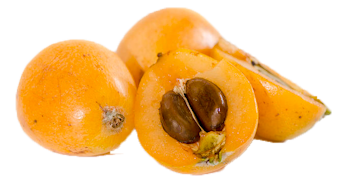|
Succulent, tangy
and sweet, wonderfully delicious loquat fruits are rich in vitamins, minerals,
and anti-oxidants. This unique fruit is originated in the mountainous,
evergreen rain forest of South-eastern China, from where it spread all across
the world including Japan. Some of common names of loquat include Japanese
plum, Japanese medlar or Maltese plum etc.
The plant is an
evergreen, large shrub or small tree belonging to the family of Rosaceae
of the genus; Eriobotrya and named botanically as Eriobotrya
japonica. It is closely related to the "apples".
Loquat fruits
begin appearing in the trees by the end of winter season. Mature fruits are
ready to harvest by June in Japan, however, their harvesting season may vary
from region to region. The fruits are oval to pear shape, appear in bunches of
5-20 and measure about 3 cm in width and 3-5 cm in length.
In general, the
fruits are allowed to ripen in the tree before harvesting. Ripe fruits have
soft texture. Externally, the skin surface is fuzzy but smooth with
golden-yellow to orange colour. Internally, the flesh is either white or orange
in colour depending on the cultivar type. Each fruit contain 3-5, centrally
placed large, brown seeds. The seeds are inedible and may contain toxic
cyanogenic glycosides.
Being rosaceae
family of fruits, loquats has similar taste and flavour as that of apples,
tart, and sweet with pleasant aroma. Loquat's leaves are also used in
traditional medicines and as herbal tea in many parts of the world.
|
|
Loquat has a number of important health
benefits, including the ability to prevent diabetes, lower cholesterol levels,
lower cancer risk, protect bone mineral density, improve gastrointestinal
health, aid vision, strengthen the immune system, soothe the respiratory
tracts, boost circulation, and decrease blood pressure.
Blood Pressure Control: One of the many
nutrients found in good supply within loquat is potassium, which acts as a
vasodilator for the body’s cardiovascular system. By reducing the strain and
pressure on the blood vessels and arteries, potassium is able to lower blood
pressure and protect heart health. Potassium is often considered a brain
booster, due to the increased flow of blood to the capillaries of the brain,
which can improve cognition.
Diabetes Prevention: Loquat tea is often
suggested as a means of preventing or treating diabetes, as blood sugar has
been shown to significantly reduce in those who regularly ingest it. The unique
organic compounds found in loquat tea are able to regulate the insulin and
glucose levels, which helps protect the body against diabetes. Also, for those
suffering from diabetes, avoiding spikes and drops in blood sugar is crucial,
which this tea can also do.
Lower Cancer Risk: There are a number of
antioxidants found within loquat that are beneficial for human health. Antioxidants
are able to neutralize free radicals within the body that are generated as a
natural by-product of cellular metabolism. These molecules with their unpaired
electrons can cause healthy cells to mutate, leading to chronic disease,
including cancer. Loquat tea has specifically been linked to lower occurrence
rates of lung and oral cancers.
Soothe Respiratory System: Expectorant
substances are important in the treatment of colds and other respiratory
infections. Loquat tea is used as an expectorant, either when drunk or gargled,
as it can cause coughing and expulsion of mucus and phlegm. This is where
bacteria can live and grow, while also exacerbating other symptoms, so
eliminating that from your respiratory tract can help you feel better fast!
Immune
System Health: Loquat is a wonderful source of vitamin C, which is a key
component of everyone’s immune system. Vitamin C helps stimulate the production
of white blood cells, the body’s first line of defence against pathogens, and
also works as an antioxidant to prevent chronic illness. Furthermore, vitamin C
is needed for the production of collagen, which aids growth and repair of
tissues throughout the body following an illness or injury.
Digestion: Pectin is a particular type of
dietary fibre found in loquat fruit, and it is often praised as a digestive
aid. Dietary fibre can bulk up the stool and stimulate peristaltic motion,
which helps with the regularity of bowel movements. If you suffer from
constipation, diarrhoea, cramping, bloating, or other stomach disorders,
dietary fibre can ease that inflammation and improve the health of your gut.
Cholesterol Levels: Although the precise
mechanism isn’t fully understood, research has directly linked loquat with
lower cholesterol levels in those subjects who regularly consumed the fruit and
tea. This health benefit of loquat is very exciting, but also relatively
unproven on a large scale, and studies to find out more are ongoing.
Strengthen Bones: Losing bone mineral density
is a major problem for many people as they age, particularly for women
following menopause. Fortunately, loquat has been shown to prevent bone density
loss in various parts of the body, owing to its rich mixture of vitamins,
nutrients, and hormone-mimicking chemical components.
Circulatory System: High iron levels in a
person’s diet are important if they want to avoid anaemia and its brutal
symptoms. Iron is found in high concentrations within loquat, which is good
news for your red blood cells. Iron is a necessary part of haemoglobin, which transports
oxygenated red blood cells throughout the body, thus boosting circulation. This
can speed healing, increase energy, and ensure that all your organ systems are
working at full capacity!
A Final Word of Warning: When we consume anything in high volumes, it can be toxic for
one reason or another, but when you consume too much loquat leaf extract (a
concentrated form occasionally sold in health food stores or naturally
derived), a strange thing happens. People have reported toxic myopathy as a
result, which consists of weakness and non-specific pain. Consume loquat and
its derived products in moderation.
|

